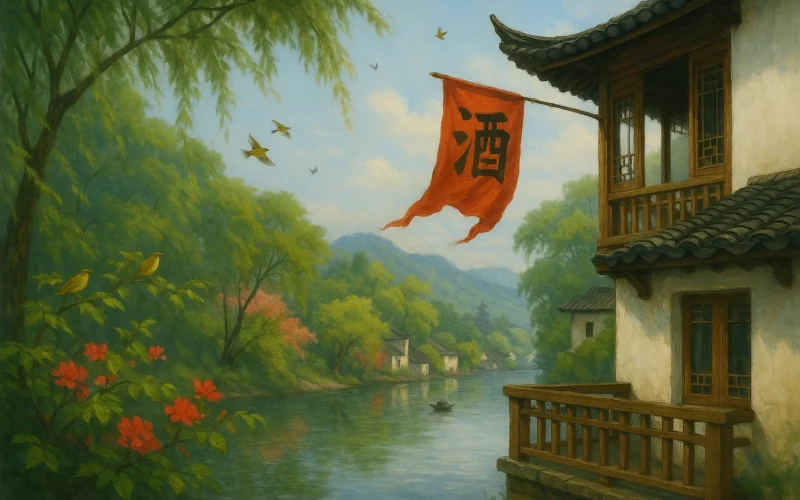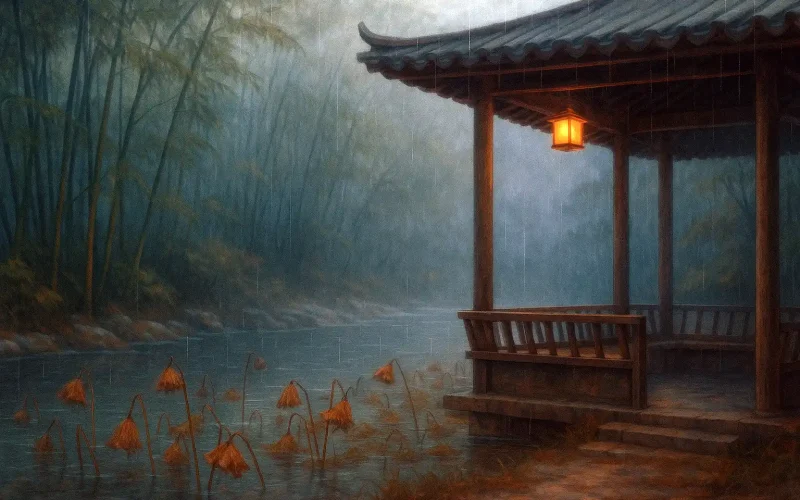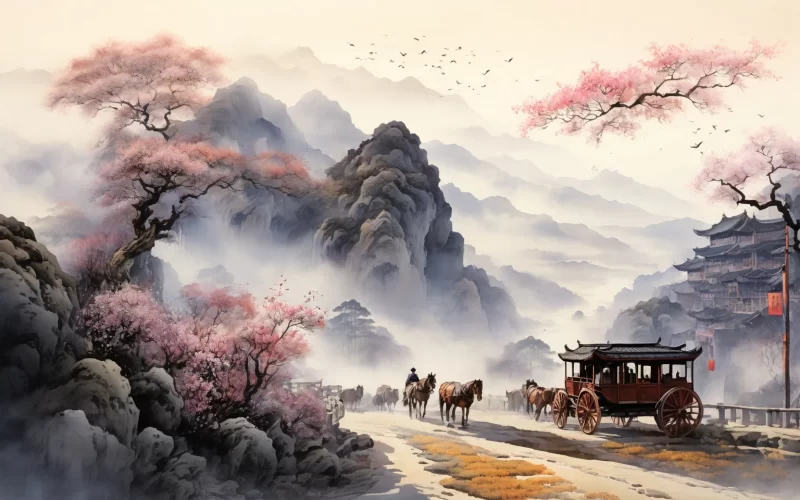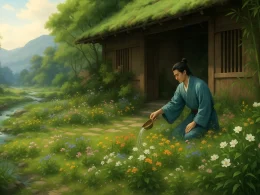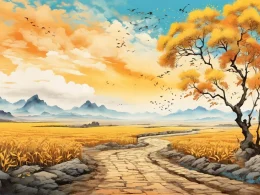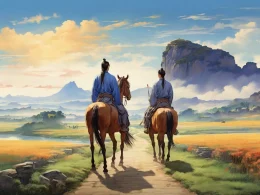A drizzling rain falls like tears on the Mourning Day;
The mourner's heart is going to break on his way.
Where can a wine shop be found to drown his sad hours?
A cowherd points to a cot amid apricot flowers.
Original Poem
「江南春」
杜牧
千里莺啼绿映红,水村山郭酒旗风。
南朝四百八十寺,多少楼台烟雨中。
Interpretation
"The Mourning Day" was written between 847 and 859 AD during the reign of Emperor Xuanzong of the Tang Dynasty. At the time, Du Mu was traveling through the Jiangnan region, captivated by the vibrant spring scenery. Inspired by the beauty around him, he composed this poem, which not only depicts the splendor of Jiangnan's spring but also reflects on the rise and fall of history, blending emotion with scenery in a deeply evocative way.
First Couplet: "千里莺啼绿映红,水村山郭酒旗风。"
Qiānlǐ yīng tí lǜ yìng hóng, shuǐ cūn shān guō jiǔ qí fēng.
For miles, orioles sing amidst the green and red; by riverside villages and mountain towns, wine flags flutter in the breeze.
The poem opens with a sweeping view of Jiangnan in spring. The phrase "for miles" (千里) sets a vast stage, while "orioles sing" (莺啼) and "green and red" (绿映红) create a lively, colorful scene filled with the sounds and sights of spring. The "riverside villages" (水村), "mountain towns" (山郭), and "wine flags" (酒旗) add a human touch, depicting the region's unique charm and vibrant life. The fluttering wine flags, in particular, animate the scene, suggesting a lively and welcoming atmosphere.
Second Couplet: "南朝四百八十寺,多少楼台烟雨中。"
Náncháo sìbǎi bāshí sì, duōshǎo lóutái yān yǔ zhōng.
The four hundred and eighty temples of the Southern Dynasties—how many towers and pavilions now stand shrouded in mist and rain?
This couplet shifts from the present to the past, evoking the historical legacy of Jiangnan. The "four hundred and eighty temples" (四百八十寺) refer to the numerous Buddhist temples built during the Southern Dynasties, a period of great cultural and religious flourishing. However, these once-grand structures now lie obscured by mist and rain, symbolizing the passage of time and the impermanence of human achievements. The imagery of "towers and pavilions in mist and rain" (楼台烟雨中) creates a dreamlike, melancholic atmosphere, blending the beauty of the natural world with the weight of history.
Overall Appreciation
This poem masterfully intertwines the vibrant beauty of Jiangnan's spring with reflections on the rise and fall of history.
The first couplet captures the lively and colorful essence of spring in Jiangnan. The singing orioles, the interplay of green and red, and the fluttering wine flags all contribute to a vivid and dynamic scene. This imagery not only celebrates the natural beauty of the region but also evokes a sense of joy and vitality.
The second couplet, however, introduces a more contemplative tone. By referencing the "four hundred and eighty temples" of the Southern Dynasties, Du Mu shifts the focus to the passage of time and the impermanence of human endeavors. The mist and rain that shroud the temples and pavilions symbolize the fading of past glories, creating a poignant contrast with the vibrant spring scenery of the present.
The famous line, "How many towers and pavilions now stand shrouded in mist and rain?" encapsulates the poem's central theme. It invites readers to reflect on the transient nature of human achievements and the enduring beauty of the natural world. The mist and rain, while obscuring the temples, also lend them an air of mystery and timelessness, suggesting that even in decay, there is a lingering sense of grandeur and significance.
The poem's strength lies in its ability to balance the immediate beauty of spring with the deeper, more somber reflections on history. Du Mu's skillful use of imagery and symbolism creates a rich tapestry of meaning, inviting readers to appreciate the present while contemplating the past.
Writing Characteristics
- Vivid Imagery and Broad Perspective
The poem opens with a panoramic view of Jiangnan in spring, using vivid imagery to capture the region's natural beauty and lively atmosphere. - Contrast Between Present and Past
The vibrant spring scenery of the first couplet contrasts sharply with the mist-shrouded temples of the second, highlighting the passage of time and the impermanence of human achievements. - Symbolism and Emotional Depth
The mist and rain that obscure the temples symbolize the fading of past glories, adding a layer of melancholy and reflection to the poem. - Elegant Language and Rhythmic Flow
The poem's language is both elegant and accessible, with a rhythmic flow that enhances its emotional impact.
Insights
This poem offers a profound meditation on the relationship between nature, history, and human experience. By juxtaposing the vibrant beauty of spring with the fading remnants of the past, Du Mu reminds us of the transient nature of human achievements and the enduring power of the natural world.
The poem also encourages us to appreciate the present moment while reflecting on the lessons of history. The temples of the Southern Dynasties, though now obscured by mist and rain, serve as a reminder of the cultural and spiritual legacy that continues to shape our world.
Ultimately, "Spring in Jiangnan" is a celebration of beauty, a reflection on impermanence, and an invitation to find meaning in the interplay between the natural and the historical. It challenges us to cherish the fleeting moments of joy and to seek wisdom in the enduring lessons of the past.
Poem translator
Xu Yuan-chong (许渊冲)
About the poet
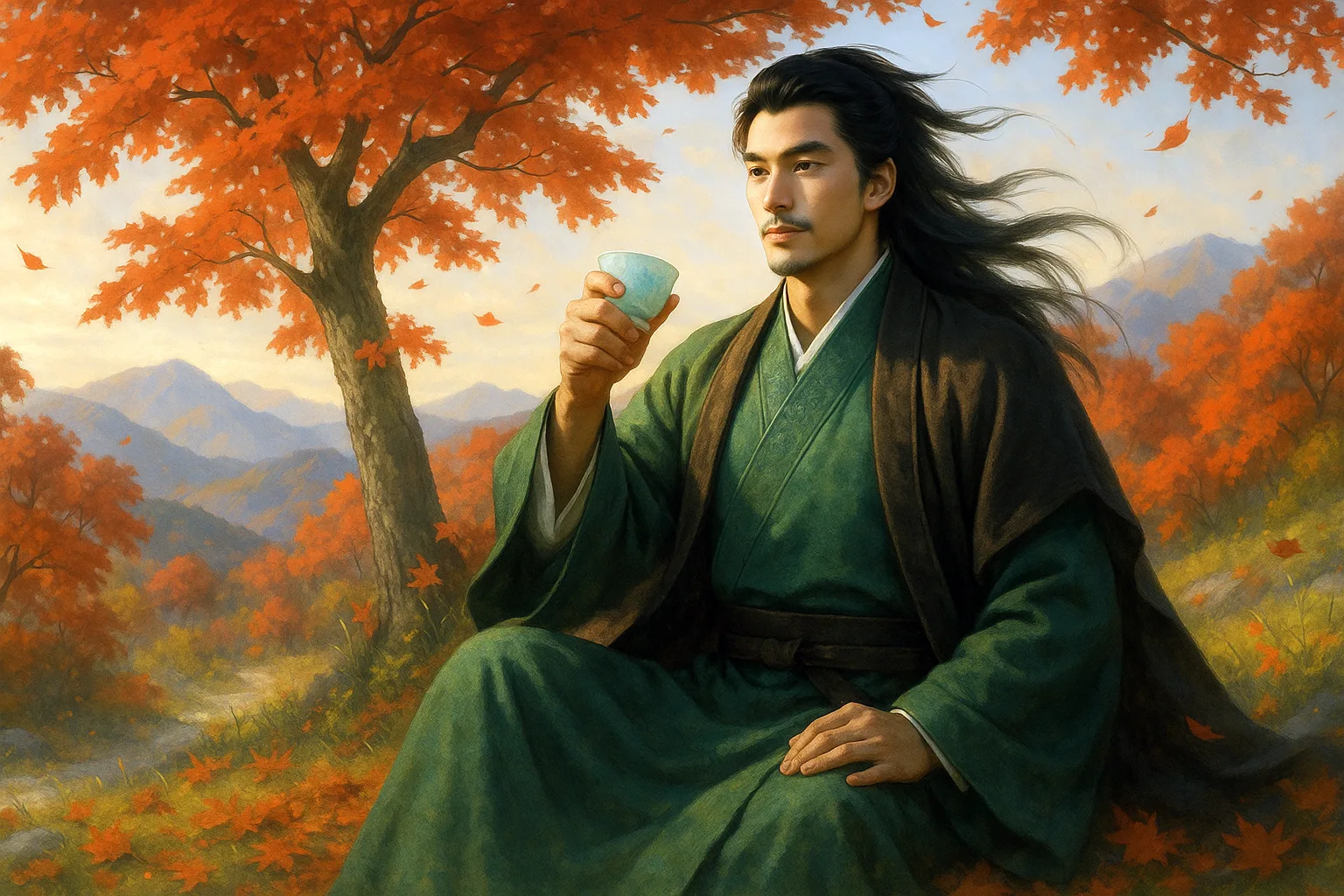
Du Mu (杜牧), 803 - 853 AD, was a native of Xi'an, Shaanxi Province. Among the poets of the Late Tang Dynasty, he was one of those who had his own characteristics, and later people called Li Shangyin and Du Mu as "Little Li and Du". His poems are bright and colorful.






